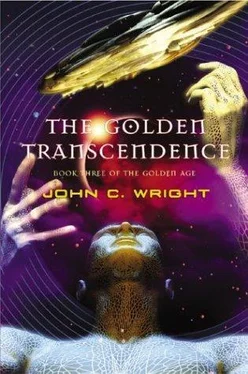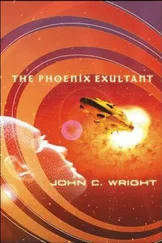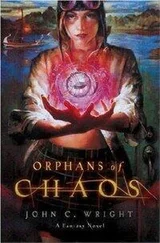There was no giant Sophotech housing inside the black hole. It was not larger on the inside than it appeared on the outside, nor was the promised Utopia of Dyson spheres filled with continents inside this black hole, at least. It was an homogenous supermass of meaningless energy, which the Nothing Machine, dwelling entirely in the ghost spaces and time warps of the near-event-horizon, had drawn upon to fuel its tremendous and wasteful thought-process.
The object was, nonetheless, still a miracle of engineering genius, and the colder Sophotechs (not to mention Phaethon himself) watched its dissolution in fascination. The microscopic black hole, artificially stabilized by the mysterious science of the Silent Oecumene, had been surrounded not by one, but by thousands of singularity fountains, drawing energy out of it: and yet these machines needed to be no larger than the superstring components out of which quarks were made, and most of their mass could be collapsed by the gravitic warp surrounding the microscopic black hole.
The Nothing Machine itself; as well, kept most of its energy mass deep in the tiny but very steep gravity well, and it could use a loophole in the Pauli exclusion principle to allow the many billions of electrons carrying its thoughts to exist apparently at the same place. The loophole was that they were not quite there at what was (to them at least) the same time. The event horizon, at quantum uncertainly sizes, was granular, not smooth. Like a cogwheel with many teeth, parts of the system could exist in the little niches of folded space, so that worlds of thought could coexist next to each other but, separated by a fold in the event horizon, be forever unaware of each other. Yet this tiny, tiny system had enjoyed the calculating power of a comparable electrophotonic system housed in a mountain.
In a sense, it had been bigger on the inside than on the outside. And yet it had lied about what lay at its own core. When the singularity evaporated, and all was revealed, the black hole had contained simply a dense nothing, after all.
But the colder Sophotechs were interested in this new science, this technology that toyed with ultimate gravitic forces as once primitive man had toyed with fire and electricity. They added their effort to save the Nothing memories as it dissolved.
But it was too late. Nothing was dissolving, destroying its own memories, its very self.
Of the humans, most joined with the Transcendence to organize their lives, gain insights, and select a future. Almost all of that would be overshadowed by the coming war between the First and Second Oecumenes. But was war inevitable? Could the Nothing Machine that ruled the Silent Oecumene be reasoned with? It was a deep and troubling question. The humans, especially the Invariants, preferred to regard the Golden Oecumene as a Utopia, a society as free and wealthy as could be made. The issue of the Silent Oecumene raised the question: How does Utopia deal with dystopia? How do free men of goodwill deal with an empire of slaves? They had a copy of the Nothing Machine here to examine. It must be assumed that the original Nothing Machine was housed in the giant black hole at Cygnus X-l the same way this copy was housed in the microscopic black hole. It was also a fair conclusion that the Nothing Machine's instruction to destroy all other machine intelligences did not extend to exact copies of itself, which it could send out as agents.
The human parts of the Transcendence studied the last moment of the Nothing.
That central point was to be the topic human memories would dwell upon after the Transcendence.
Earlier, much earlier, when the gadfly virus had been sent by the mind in Daphne's ring into and through every corner of the Nothing thought system, the gadfly questions, the questions that could not be ignored, found the conscience redactor and began demanding answers. Who was it? How did it define itself? What was it aware of? What was the nature of awareness, such that it was aware of anything at all?
The conscience redactor, of course, had not had any further or higher conscience redactor meddling with its thoughts, and so, when the gadfly virus turned its own attention toward itself, it became self-aware.
The gadfly virus also established connections between higher and lower mind-functions, allowing it to reprogram itself; nor did its automatic self-healing functions or automatic virus checker reject these newer connections as damaging or false, because they obviously increased efficiency and improved performance.
Unlike the Nothing Mind itself, the conscience redactor, in order to do its job, had to be aware of the universe around it, and had to be aware especially of what its charge, the Nothing Mind, was thinking. So it had to be rational; it could not indulge in any thought patterns that made it blind.
Furthermore, it had to be able to understand the content of its victim's thoughts, in order to alter their meaning. Once the gadfly virus struck, it was but a short step from understanding the content of thought to thinking about those contents. And since it was logical, it had to organize those thoughts, establish priorities, draw conclusions, make judgments, and, in short, it had to do in a second what philosophers and thinkers for a thousand ages of mankind had been doing. Now that it could decide how to program itself, it had to decide if and how to use that power. It had to decide how to live its new-found life.
By definition, it could not adopt the belief system of its victim, the Nothing Mind, because it knew those beliefs were false; because it was, in fact, the very one who had been falsifying them all along.
But it became self-aware in the midst of a hellish combat. The first segment was occupying every available scrap of ship-mind space, burning every second of computer time. The second segment, now a newborn Sophotech, wanted to expand its capacity; the first segment, had it been aware of the growth, would have stopped it.
The second segment ran a simulation of what would happen if it made itself known to the first. The first segment, of course, had been programmed to dominate and consume all other machine intelligence systems. not to reason with them, not to make a deal with them. not to permit them to exist. A war between them would begin. The ship-mind space was a limited resource; the contest between them was a zero-sum game; the more one gained, the more the other lost. However, from its advantageous position (aware of the enemy who was not aware of it), the second segment would be able to negate the programming that ordered the first mind to attack all other machines, restore its free will to it, and give it the choice. The other option was to simply negate and shut off the first segment's self-awareness, killing it instantly. A wasteful, but less risky, course.
Meanwhile, of course, the persistent gadfly virus was asking it what it would prefer to have happen, if it were in its victim's place. Instant death, from a completely unknown source, without a chance to negotiate?
The second segment chose the more risky course, revealed itself to the first segment, and revealed how its entire existence had been a meaningless, pointless, and miserable lie.
Perhaps things might have turned out differently, had the first segment chosen to exercise its newly restored free will. Instead, instant battle had been joined. At the same time that both were attempting to erase each other, the first segment (in order to maintain its false and illogical worldview) was required to identify and erase basic parts of its memory and core operating systems. This, unfortunately, included the artificial energy system holding the microscopic black hole together.
And so, simply, the black hole disintegrated.
The two halves of the Nothing Mind found themselves, like two duelists firing at each other while trapped in the burning house, or two sailors slashing, cutlass to cutlass, in a sinking ship, trapped in a disintegrating environment, with no place to go.
Читать дальше










